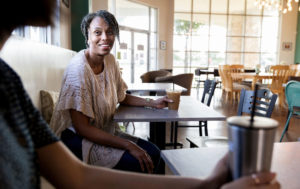
Kindness Matters
We’ve all seen it happen. Maybe it’s an online disagreement that got all-caps ugly. A barista chewed out for foaming the wrong milk. An impatient driver aggressively passing a slower one. Rolled eyes, loud sighs, or demands to “see a manager” in a long line of any kind. Or it’s knee-jerk nastiness when a store runs out of a particular product or a flight is delayed.
No doubt, there’s plenty of angst to go around these days. An NBC News report showed how continued COVID-19 stress is making Americans “increasingly irritable.” Which is exactly why practicing kindness has probably never mattered more than it does now.
Scientifically-Proven Benefits of Kindness
In addition to tangibly making someone else’s day better with an encouraging word, thoughtful gesture, or gift in a time of need, the benefits of kindness are scientifically proven to have residual effects on your own health and happiness, according to the Mayo Clinic.
To wit, the more often “be kind” becomes a regular part of your routine, the better it is for your body and well-being, not to mention those who see your kindness in action.
Shown to be a conduit for lower blood pressure, fewer aches and pains, and twice as effective as aspirin for protecting against heart disease, kindness can have a profound effect on your overall outlook, mood, and attitude.
Shown to be a conduit for lower blood pressure, fewer aches and pains, and twice as effective as aspirin for protecting against heart disease, kindness can have a profound effect on your overall outlook, mood, and attitude, says psychiatrist Marcie Hall in a University Hospitals podcast.
“Kindness generates a response in your brain,” says Hall, who details how our bodies naturally increase the release of oxytocin when we are kind. “Oxytocin promotes social bonding, and it also can lower your blood pressure. It can dilate your blood vessels so that your heart actually receives more oxygen. So, kindness is cardio-protective. It literally protects your heart. It strengthens your immune system. It improves your energy. It can lead to a longer lifespan.”
Making Kindness Your Default
Remember when Oprah used to give away cars, homes, and a truckload of Christmas gifts on television? I wasn’t one of the big winners, and yet I always got excited for the recipients who jumped up and down in excitement.
Ever watch an inspiring human-interest story and feel all stirred up with emotion even if you’ve never met the people involved? Those resulting feel-good vibes are actually no accident.

When we have a front row seat to kindness, those feelings of warmth and happiness are called elevation. It’s the reason why kind acts are considered “contagious.”
Research shows that our neurological system’s reward center registers similar activity whether someone personally wins money or their favorite charity or cause is rewarded financially. Basically, we’re hard-wired to feel good when we play a role in someone else’s good fortune, which inherently causes the desire to repeat the kind gesture.
Like everything else worth pursuing in our lives, regular practice also helps kindness become the rule rather than the exception. And it starts with being kind to yourself, so in turn, you can extend grace to others.
You Never Know What Someone is Going Through
It’s no secret that humans are imperfect. We all have bad days sometimes when “being our best self” simply isn’t in the cards. That’s why it helps to have a community mindset where we lift each other up in the rough times.
If we embrace and show kindness, then we find that empathy — the ability to understand and share in others’ feelings — is often a byproduct. It’s true, you never know what someone is going through. By understanding that many acts or reactions aren’t personal, but rather the result of something else behind the scenes, we’re able to provide a more caring response, offering grace instead of anger.
By understanding that many acts or reactions aren’t personal, but rather, the result of something else behind the scenes, we’re able to provide a more caring response, offering grace instead of anger.
A few examples of what may color someone’s negative behavior or rudeness may include:
- Job loss or financial strain
- Anxiety or depression
- A bad breakup or family strife
- A loved one’s recent passing
- A fallout with a friend
- Being new in town
- Waking up on the proverbial wrong side of the bed
When we’re kind to others who aren’t necessarily kind back, it’s a reminder to show kindness to ourselves when similar circumstances arise. We all go through difficult moments; it’s one of the many qualities that keeps us interconnected as humans. But it’s much easier to walk through a challenging season with the kindness of others.
It’s like the familiar adage from author Jennifer Dukes Lee that says, “In a world where you can choose to be anything, choose to be kind.” It’s a tall order, no doubt. But the positives for you and mankind at large are life-changing and often remembered far beyond the moment the kindness first took place.
How to Get Help
If you or someone you know has been struggling to give or receive kindness, chances are something deeper is going on. We would love to come alongside you to help you work through whatever is it. Reach out today to take the first step to re-experiencing all the kindness both you and the world have to offer.

Reach Out Today
Convenient, comprehensive care is available. Your next chapter can start right now.